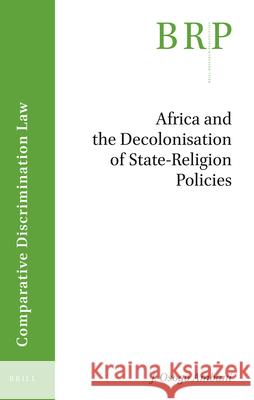Africa and the Decolonisation of State-Religion Policies » książka
Africa and the Decolonisation of State-Religion Policies
ISBN-13: 9789004446410 / Angielski / Miękka / 2021 / 76 str.
This book argues that a view has taken root in Africa, which equates state-secularism to the aggressive removal of religion from the public sphere or even state ambivalence towards religious affairs. This view arises from a misguided interpretation of the practice of state-secularism particularly in France, Turkey and the US, which understanding is ill-suited for the sub-Sahara Africa’s state-religion because the region boasts of at least three major religious traditions, African religion, Islam and Christianity, and blanket condemnation of public manifestation of religion or ambivalence towards it may offend the natural flourishing of this trinity and more. The contribution holds that most applications of state-secularism in Kenya, Nigeria and Uganda favour the Christian faith, which during its tumultuous experiences in Europe survived the enlightenment, the reformation and like experiences socialised to co-exist with what are now called secular states. Additionally, due to the long history of Christendoms in Europe, Christian principles penetrated the colonial legal systems that were bequeathed to Africa at independence and the sustenance of the colonial legacy means that the Abrahamic faith has an upper hand in the state-religion relations’ contest. The obvious loser is African religion which has suffered major onslaughts since the colonial days.











